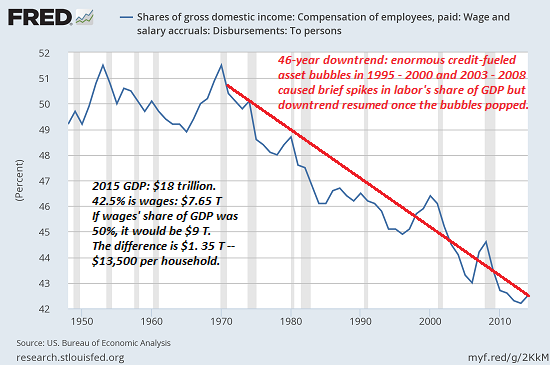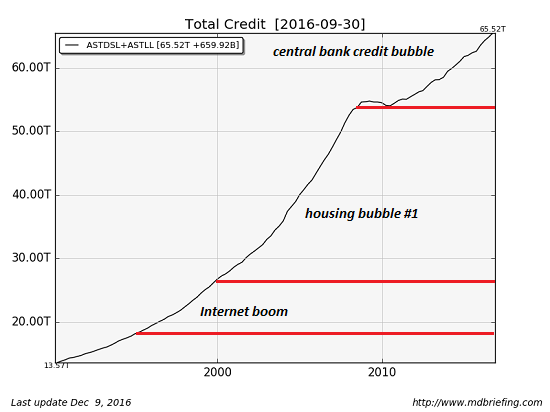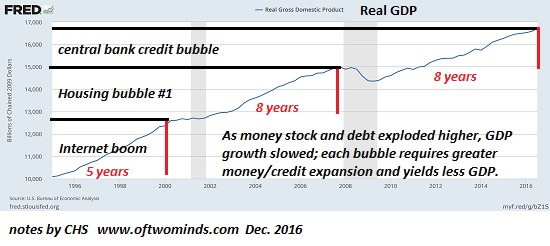
Posted on 02/06/2017 9:49:58 AM PST by SeekAndFind
Your skills, knowledge and and social capital will emerge unscathed on the other side of the re-set wormhole. Your financial assets held in centrally controlled institutions will not.
Longtime correspondent C.A. recently asked a question every American household should be asking: which assets are most likely to survive the "system re-set" that is now inevitable? It's a question of great import because not all assets are equal in terms of survivability in crisis, when the rules change without advance notice.
If you doubt the inevitability of a system implosion/re-set, please read Is America In A Bubble (And Can It Ever Return To "Normal")? This brief essay presents charts that reveal a sobering economic reality: America is now dependent on multiple asset bubbles never popping--something history suggests is not possible.
It isn't just a financial re-set that's inevitable--it's a political and social re-set as well. For more on why this is so, please consult my short book Why Our Status Quo Failed and Is Beyond Reform.
The charts below describe the key dynamics driving a system re-set. Earned income (wages) as a share of GDP has been falling for decades: this means labor is receiving a diminishing share of economic growth. Since costs and debt continue rising while incomes are declining or stagnating, this asymmetry eventually leads to insolvency.
The "fix" for insolvency has been higher debt and debt-based spending--in essence, borrowing from future income to fund more consumption today. But each unit of new debt is generating less economic activity/growth. This is called diminishing returns: eventually the costs of servicing the additional debt exceed the increasingly trivial gains.



What happens when the bubbles pop, despite massive central bank/state interventions? The entire socio-political/financial system goes through a "system re-set" in which all the fantasy-based valuations, political denials, false promises and fraudulent claims collapse in a heap.
In a crisis, the privileged Elites will change the rules in a desperate attempt to expropriate the income and wealth of the bottom 99.5% to preserve their own power.
The trick is to do so in ways that won't spark an immediate political insurrection.
We can better understand their policy choices by asking: What's easy to expropriate, what's difficult to expropriate?
Those assets that are easy to expropriate will be expropriated first. Those that are difficult to expropriate are far less likely to be grabbed, due to the high costs of expropriation and the high risks of sparking a political insurrection.
History suggests the privileged Elites will pursue two basic strategies to expropriate the income and wealth of non-elites:
1. They will expropriate what is easy to expropriate: financial assets in centralized institutions the state controls: banks, brokerage accounts, insurance policies, etc.
2. They will use the time-honored "stealth expropriation" methods: inflation and taxes.
Any "money" held in a centrally controlled institution can be expropriated overnight. The rules will change without warning, so there will be no opportunity to escape the system.
Direct expropriation takes many forms. Your funds could be "bailed-in" (transferred to the bank). Large currency bills could be declared worthless. IRA and 401K accounts could be transferred into government bonds, to "protect the account owners from risky investments." (Naturally, any expropriation will be presented as "for your own good.")
Or a new currency could be issued that strips away 90% of the purchasing power of the old currency. It could be a New Dollar, an SDR global currency, or a state-issued cryptocurrency. The point is to strip away 90% of the wealth held in the old currency.
Indirect "stealth" expropriation has several forms: slow currency devaluation, also known as inflation, or higher taxes and junk fees (not called taxes, but you receive no additional value for the higher fees).
The end result of these policies is you may receive the $2,000 monthly pension you were promised, but after inflation, currency devaluation and taxes, your real purchasing power is $100 in today's currency.
So what's difficult to expropriate? I present some answers in my books An Unconventional Guide to Investing in Troubled Times and Get a Job, Build a Real Career and Defy a Bewildering Economy.
It's impossible to expropriate one's skills, experience and social capital. These are intangible forms of capital and so they cannot be confiscated like gold, currency, land, etc.
Land and homes are difficult to expropriate for two reasons: private property is the backbone of capitalism and democracy, and the state confiscating private property would very likely spark a political insurrection that would diminish or threaten the power and wealth of the privileged Elites.
Secondly, it's very costly for the state to maintain the productive output of real property it has confiscated. Guards must be posted, sabotage repaired, and the immense difficulties of coercing a rebellious populace to continue working what they once owned for the benefit of the state and its privileged Elites must be solved and paid for.
The state can expropriate farms, orchards and workshops for back taxes (or some similar extra-legal methodology), but how do you force people to work these properties productively?
As a general rule, whatever the super-wealthy own will be protected from expropriation. Private real property is the foundation of the Elites' wealth, and while the land of debt-serfs may well be confiscated for back taxes (the wealthy will buy exemptions from rising taxes), those who own land and buildings free and clear constitute a political force to be reckoned with.
As I discuss in my book Resistance, Revolution, Liberation: A Model for Positive Change, there's one other asset the state and its ruling Elites cannot expropriate: community.
The state will also have difficulty confiscating assets that are outside its reach. This explains the propularity of owning assets in other nations, and the debate over cryptocurrencies: will states be able to confiscate all cryptocurrencie at will, or is that technically unfeasible?
The main takeaway is this: your skills, knowledge and and social capital will emerge unscathed on the other side of the re-set wormhole. Land and real property you own free and clear (no debt) is likely to remain in your possession, as long as you can pay soaring taxes/junk fees during the crisis phase. Your financial assets held in centrally controlled institutions will not make it through unscathed; they are simply too easy for central authorities to expropriate.
He’s got a couple of things wrong:
>>>>>”Land and homes are difficult to expropriate for two reasons”
While Detroit is only the most obvious example (want a 3 bedroom house for $50 bucks?) it’s fairly easy to use marauding hordes to strip value from residential real estate.
In Atlanta in the 1960s they used blockbusting.
Real estate values can evaporate when it is in the interest of the powerful for them to do so. And you have to hold possession - if you consider the fenced off vacant commercial property something you want to pay taxes on until the elites decide to ‘gentrify’ the area in a few decades.
>>>>>”the debate over cryptocurrencies: will states be able to confiscate all cryptocurrencie at will”
He misses the point completely there. It isn’t the state that has been making wealth held in cryptocurrencies disappear. The trusted holder claims that they’ve been hacked, shut down their business, and your incorporeal asset has disappeared without even a simple ‘poof’.
It’s like they used to say about gold. ‘If you can’t touch it, you don’t own it, you own a piece of paper’ or in the case of crytocurrencies, you own a thumb drive or some other electronic ‘storage’ bits and bytes.
I used to have a thousand Mark note stamped diagonally across with million. It survived alright.
Agree with most of the remainder of the list, but don’t know enough about cryptocurrency to have an opinion. I question the inherent value. PM , tools, RE, knowledge & reputation will always have value.
This will come as news to Bill Gates, Larry Ellison, Warren Buffett, Mark Zuckerberg, etc., etc., etc. Real private property is NOT the dominant form of wealth in the U.S. today. Nor is it immune to confiscation through expropriate taxation or regulation.
Cryptocurrencies have an element of risk, heck the technology is only a few years old, and they do depend upon the Internet, but it's not only cryptocurrencies that have the Internet as their Achilles heal nowadays, it's banking, resupply, transportation, travel, security, manufacturing, and many more critical systems that we rely upon today. I would never advocate sinking more than what you could afford to lose in any one thing.
And talk about fiat money, good grief, what exactly determines the value of cryptocurrency? “Mining,” lol? I remember my young niece being fascinated with Minecraft, not exactly a big money-maker for her.
There are plenty of informative videos on Youtube that explain the process in detail, for those interested. I can tell you from 3 years of experience that "mining" ain't so easy. It requires equipment, time, and lots of electricity.
Don’t put your faith in any form of currency if you believe the governing systems to which they inevitably belong will cease to exist. Scrip and local currencies will arise in the absence of any other alternative, as they have in the past, with the value agreed upon by those participating and policed by those participating as well.
True, diversify to an extent that's practical for you. One of the best forms of currency ever invented, utility wise and at this day and time, are Cryptocurrenices, IMO.
If you’re planning for SHTF, it’s best not to pin your “money” to the fan, though.
I don’t have much money to invest in “things”, so I focus on skills. And the physical things I do invest in tend to be the kind that grow.
Literally. My seed inventory took 8 pages this year.
I have 5 acres, but no house yet. Still working on that part. I’m developing a reputation as a plant breeder and herbal expert. I’m not sure yet how much of that is justified, but herbal medicine was an obsession of mine when I was a teen, and I’ve been getting back into it the last couple years. And the plant breeding is just plain fun :) I even have 2 seed companies interested in the bean I’m developing.
I’m of the opinion that you can never have too many skills.
I smile at this. The basics for living still falls under Abraham Maslow’s needs.
The basics of his needs for existence are called deficiency needs because a person does not feel anything if they are met, but becomes anxious if they are not. Thus, physiological needs such as eating, drinking, and sleeping are deficiency needs, as are safety needs like shelter and security. And the magical problem with any of these is they are controlled by the government through taxation supply and demand. And these are just the basics.
The same thing happened during Y2K. Everything was going to fall apart. And the only people with enough of anything to possibly survive was the rich or the government. Or so they think.
Additionally, what is everyone going to do when other countries come looking for food because we support most of the world with that now and we won’t be able to do so?
No place to run and hide as they will be effected more than us. This is what happens when you try to borrow from Peter to pay Paul and then borrow from Shirley and not find enough to pay either back. And when it happens, you won’t have a chance because you will be vastly outnumbered. The same as the rich and the government.
red
Gold and silver. If you don’t have it get you some.
Agree, and trust me, we’re on the same sheet of music when it comes to diversification. ;)
Yes and the EPA sez those water puddles after a rain belong to them.
And decide some insect is in fear of extinction and your endangering them.
You really don’t own that land, you just rent it.
Here is a thought I’m thinking regarding a System Reset. Lots of people lose financial assets, then jobs, and the ability to sustain themselves. Individuals or gangs begin stealing by force. Police and the government become overwhelmed, and lots of theft and assaults go unanswered.
Would the local governments still enforce regulations on property? In other words, if a property owner beefs up their security on the perimeter of their home, would local government let it go? For instance, in my area one can have a solid six-foot fence, total of eight-feet height if the upper two-feet are see-thru. In front, only a few feet height. What if I quickly installed a solid 8-foot wall all around, which is against the rules? Because that is what I would do to keep marauding gangs out. (Besides using my stockpile of ammo.) One thing in my favor, is that my neighbors on my block will band together to defend the block, and we have no gangs near the neighborhood. I can see the rule of law breaking down as people do whatever they want in order to protect their assets.
Isn't there a category of deed that gives you absolute ownership? I know freehold is one name. I don't think it exists in the US. There's another name for it.
An Economic bubble about to burst ? Which of your assets are likely to resist an economic decline ?
Please read the comments for critical thinking and assessment.
Any idea as to how safe a gold IRA is? It’s physical gold, but stored at the Delaware Depository? I’d rather have it at home, but since it’s an IRA, evidently I have to store it out of reach.
All I know is that the day after I write the last check for my seventh college graduate, all student loans will be forgiven.
That would depend a great deal upon the nature of your local jurisdiction(s). I’m of the opinion that some areas will go Lord Of The Flies, some areas will manage to adhere and maintain a sense of order and normalcy as before, and most will be somewhere in between, possibly switching from one to the other in waves as new disruptions hit.
There’s also a good possibility that there will be local jurisdictions to go full on authoritarian, more likely to the left than to the right given present realities.
Be careful where you live and own property, in other words, not just due to physical attributes and location, but also just who has authority over it and how those authorities would be likely to react. Look closely, there are “tells.”
You don't. You hand the confiscated property to others (the previously "disenfranchized," "underprivileged," "wretched," or however they are called.) They are allowed to "farm" or otherwise "manage" the stolen properties, but - like sharecroppers - must give the lion's share to the State.
Of course, the new "owners" aren't highly motivated, and will probably eventually run the property into the ground - but nobody's perfect.
Regards,
Precious metals.

Aren't there others who are wealthy beyond our wildest dreams, and when are the democrats going to do something about that unfair gap?
Disclaimer: Opinions posted on Free Republic are those of the individual posters and do not necessarily represent the opinion of Free Republic or its management. All materials posted herein are protected by copyright law and the exemption for fair use of copyrighted works.